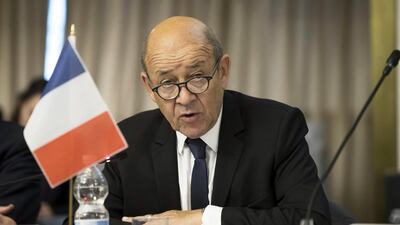France said on Wednesday that "all indications" suggest the Syrian regime is using chlorine weapons in its nearly seven-year civil war against rebel forces.
"All indications...tell us today that chlorine is being used by the regime at present in Syria," Foreign Minister Jean-Yves Le Drian told BFM television.
"I'm weighing my words because as long as we haven't completely documented this we have to stay prudent," he said.
UN war crimes investigators said on Tuesday that they were studying "multiple" reports that chemical weapons have been used in the rebel-held zones of Eastern Ghouta, near Damascus, and in the northwestern Idlib Province in recent weeks.
The United States said this week there was "obvious evidence" of recent chlorine gas attacks, including in Eastern Ghouta.
Mr Le Drian pointed to the "partnership against impunity" agreed by two dozen countries in January to ensure that perpetrators of chemical attacks in Syria are held accountable. But he did not allude to any other response, including military retaliation, that France might take against the regime of President Bashar Al Assad if the attacks are confirmed.
Shortly after taking office last year, French President Emmanuel Macron said the chemical attacks in Syria would be a "red line" for France.
_______________
Read more:
UN probing suspected use of chlorine gas by Syrian regime
Incubators for newborns shut down after airstrikes hit Idlib hospitals
_______________
Asked whether he wanted Turkish armed forces to withdraw from Syria, Mr Le Drian replied that he wanted "the withdrawal of all of those who ought not to be in Syria, including Iranian militia, including Hezbollah."
While not specifically calling for Turkey to pull back from its offensive against Kurdish militias in northern Syria, he said that Ankara should not worsen the conflict.
"Ensuring the security of its borders does not mean killing civilians and that should be condemned. In a dangerous situation in Syria, (Turkey) should not add war to war."
International law "is being violated by Turkey, by the Damascus regime, by Iran and those who are attacking eastern Ghouta and Idlib", he said. His remarks amount to France's toughest line yet on Turkey's involvement in the Syrian conflict.
France has backed the Syrian opposition during the seven-year war and is part of the US-led coalition fighting ISIL.
Mr Le Drian is due in Tehran on March 5 for talks over its ballistic missile programme, the nuclear deal agreed with world powers in 2015 and the role of Iran in the region at a time when the United States has put pressure on its European allies to toughen their stance on Tehran.
Iran is a key ally of the Syrian government and it says it has no intention of withdrawing unless Syria requested it do so.
Mr Le Drian also said Kurdish forces fighting ISIL in northeast Syria had detained "about 100" French jihadists.
"We're being told that about 100 have been arrested by the Kurds in Syria," he said.
French officials have shown little inclination to repatriate any of these captured fighters, as well as those facing potential death penalties in Iraq, saying they should face local courts.

